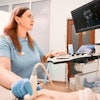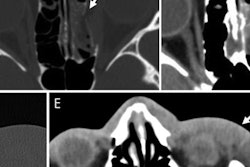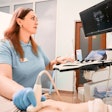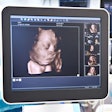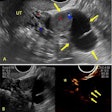Dear AuntMinnie Member,
Artificial intelligence (AI) has been grabbing headlines of late, so what could be more intriguing than an AI algorithm developed in Russia? Our article on the project was one of the top stories on AuntMinnie.com this past week.
Researchers from St. Petersburg developed the algorithm -- which they waggishly called Doctor AI-zimov -- and found that it can identify and mark lung nodules on CT scans in under 20 seconds. What's more, the algorithm can detect suspicious nodules down to 2 mm, well below the 6-mm threshold at which suspicious nodules are typically worked up.
They plan to continue testing the algorithm, which they hope someday to enhance to examine x-ray and ultrasound images of various organs.
In other news in artificial intelligence, researchers from Washington University School of Medicine in St. Louis used a combination of PET scans and a machine-learning algorithm to find out that women's brains appear to age more gracefully than those of men. Intrigued? Just visit our Artificial Intelligence Community for more.
Radiology and uterine tumors
Our article from earlier in the week on whether radiology should implement a scoring system for uterine tumors generated quite a debate. Dr. Hooman Noorchashm, PhD, shared the tragic story of how his wife, Dr. Amy Josephine Reed, died of uterine cancer that he believes was spread by a power morcellator used to resect uterine fibroids.
Dr. Reed was one of a small number of women whose uterine fibroids turn out to be malignant, and the use of power morcellators to resect these fibroids has been a controversial issue. Dr. Noorchashm believes that a uterine tumor grading system similar to the BI-RADS nomenclature for breast masses could prevent similar cases in the future. The article also started a debate in our Forums.
Another important women's imaging story this week concerns a study that found that primary care physicians can have a big effect on whether women seek out screening mammography -- especially among racial and ethnic minorities. In addition, another study indicates that radiology can play an important role in detecting cases of intimate partner violence -- which disproportionately affects women.
More articles like these are available in our Women's Imaging Community.
Remembering Dr. Phillip Berman
Yesterday marked 10 years since the death of AuntMinnie.com founder Dr. Phillip Berman, who died of non-small cell lung cancer at the age of 55. A radiologist by training, Dr. Berman was a true visionary who changed radiology in many ways and touched the lives of so many people in our profession.
Sheila Ross from the lung cancer patient advocacy group Lung Cancer Alliance was one of his close friends. Ms. Ross shares her thoughts on Dr. Berman and what he might think of the current state of CT lung cancer screening.
Last chance for SalaryScan
Finally, our SalaryScan survey ends on February 15. That means there are only a few days left for you to be entered into a drawing for one of 10 $100 Amazon gift cards that we're giving away to U.S. radiology professionals who fill out the survey. We'll use the data to develop a comprehensive database that you can use to see how your salary compares to what your colleagues are earning. Get started at salaryscan.auntminnie.com.
